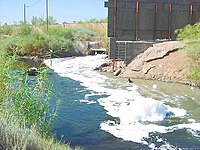
Photo from wikipedia
AimOur study examines the transformation of environmental knowledge into pro-environmental behavior using national survey data under the framework of social cognitive theory.Subjects and methodsA total of 11,438 respondents (male = 5756, mean… Click to show full abstract
AimOur study examines the transformation of environmental knowledge into pro-environmental behavior using national survey data under the framework of social cognitive theory.Subjects and methodsA total of 11,438 respondents (male = 5756, mean age = 48.60 years, SD = 16.39) participated in the Chinese General Social Survey. Analysis included descriptive and correlation analysis, hierarchical regression and structural equation modeling.ResultsOur findings suggest that dwelling environmental knowledge is a stronger predictor of private pro-environmental behavior than professional environmental knowledge, while professional environmental knowledge is the only contributor to public pro-environmental behavior. Moreover, only dwelling environmental pollution perception shows additional variances in explaining private pro-environmental behavior, while both dwelling and natural environmental pollution perceptions have significant and additional effects on public pro-environmental behavior.ConclusionIntegrating these variables into a single comprehensive model via structural equation modeling reveals that dwelling environmental pollution mediates the relationship between dwelling environmental knowledge and the two types of environmental behavior (i.e., private pro-environmental behavior and public pro-environmental behavior) and that professional environmental knowledge only shows a direct effect on public pro-environmental behavior.
Journal Title: Journal of Public Health
Year Published: 2017
Link to full text (if available)
Share on Social Media: Sign Up to like & get
recommendations!